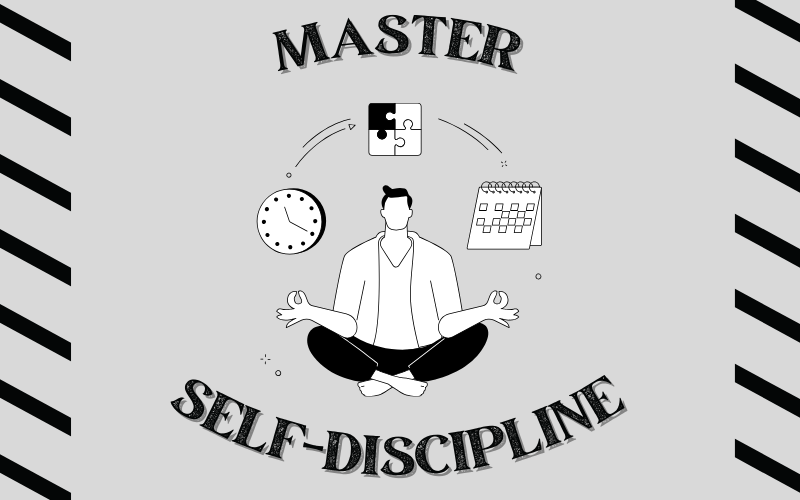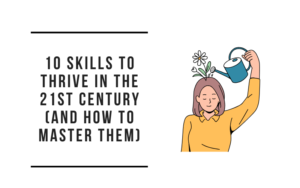Self-discipline is the foundation of success—whether you’re aiming to improve your health, boost productivity, or achieve long-term goals. But building and maintaining self-discipline isn’t always easy. That’s why we’ve rounded up the best tools, strategies, and resources to help you stay consistent, focused, and in control. In this guide, we’ll compare top self-discipline products across key categories to help you find the right fit for your journey.
Table of Contents
What is Self-Discipline? (Defining the Core Concept)
At its core, self-discipline is the ability to control your impulses and actions to achieve your long-term goals, even when faced with immediate temptations or distractions. It’s about aligning your behavior with your values and priorities, consistently choosing to do what you know you should, even when it’s challenging or uncomfortable.

Think of it like this: Imagine you’re on a diet. You crave a piece of cake, but you know indulging will derail your progress. Self-discipline is the internal strength that allows you to resist the temptation and stick to your healthy eating plan. It’s about prioritizing your long-term health and well-being over short-term gratification.
Self-discipline is often intertwined with other important qualities like willpower, self-control, and delayed gratification. Willpower is the mental energy you exert to resist impulses and stay focused. Delayed gratification is the ability to forgo immediate rewards for larger, more meaningful ones in the future. All of these qualities contribute to the overall ability to regulate your behavior and make conscious choices that support your goals.
It’s important to note that self-discipline is not about rigid restriction or denying yourself pleasure altogether. It’s about finding a balance between fulfilling your immediate needs and pursuing your long-term aspirations. It’s about making conscious choices that align with your values and support your overall well-being.
The Psychology Behind Self-Discipline
Self-discipline is more than just willpower—it’s rooted in how your brain works. By understanding the psychology behind it, you can train your mind to stay focused, avoid distractions, and make smarter long-term decisions.
How the Brain Controls Self-Discipline

The prefrontal cortex, the front part of your brain, plays a major role in self-discipline. It helps with:
- Impulse control
- Decision-making
- Goal setting
When you’re tired, stressed, or overwhelmed, the prefrontal cortex becomes less active, making it harder to make disciplined choices.
🛠️ Tip: Tools that help you manage stress and stay organized can boost your self-discipline over time.
Delayed Gratification: The Key to Long-Term Success

One of the most well-known studies in psychology—the Marshmallow Test—showed that people who could delay gratification (wait for a bigger reward) often had better life outcomes.
This ability to say “no” now for a better “yes” later is a core part of self-discipline.
📘 Recommended Read:
The Marshmallow Test by Walter Mischel
Learn how early self-control predicts future success.
The Power of Habits

Your brain loves shortcuts. That’s why habits are so powerful—they reduce the mental effort needed for discipline.
With enough repetition, disciplined behavior becomes automatic.
📗 Recommended Read:
The Power of Habit by Charles Duhigg
Understand how habits work and how to change them for good.
Emotions, Stress & Self-Control
High stress or emotional fatigue makes it harder to stay disciplined. That’s why taking care of your mental and emotional health is crucial.
💡 Simple daily practices like meditation, journaling, and quality sleep improve your brain’s ability to stay focused and make disciplined choices.
📙 Helpful Tool:
The 5 Minute Journal
Boost mindfulness and stay emotionally centered in just minutes a day.
Quick Recap
| Psychological Factor | How It Supports Self-Discipline |
|---|---|
| 🧠 Prefrontal Cortex | Helps with focus, planning, and impulse control |
| ⏳ Delayed Gratification | Encourages better long-term decision-making |
| 🔁 Habit Formation | Makes disciplined actions automatic |
| 😌 Emotional Regulation | Supports consistent behavior under stress |
Why Self-Discipline is Crucial for Success
Self-discipline is the hidden driver behind nearly every success story. It’s the ability to stay focused, follow through, and keep working toward your goals—even when things get tough. Here’s why it matters more than you might think:
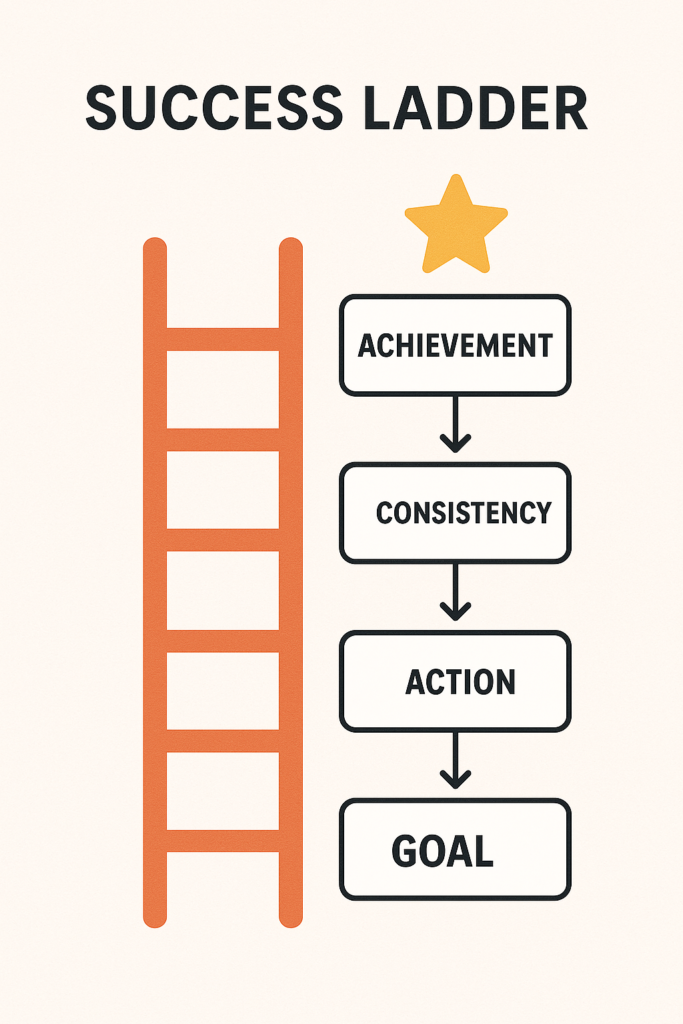
1. Consistency Beats Talent
While talent gives you a head start, consistency fueled by self-discipline is what keeps you moving forward.
💡 Discipline means doing the right thing even when you don’t feel like it.
2. Master Time Management
Disciplined individuals are better at managing time, avoiding distractions, and getting things done efficiently. Use digital tools to build this habit:
📌 These apps help reinforce routine and reduce procrastination.
3. Boost Focus & Productivity
With self-discipline, you’re less likely to get sidetracked. Time-tracking tools like Toggl can help you stay sharp and efficient throughout the day.
- Create deep work sessions
- Track distractions
- Build better work habits

4. Build Healthier Habits
From exercise to nutrition, self-discipline helps you stick to better lifestyle choices. One of the best resources to guide you is this book:
📘 Atomic Habits by James Clear
Learn how small changes lead to powerful, long-term results.
5. Strengthen Your Willpower
The more you practice discipline, the easier it gets. Over time, your willpower grows stronger—just like a muscle.
🔁 Discipline = daily reps of positive action.
6. Increase Confidence and Self-Worth
Keeping promises to yourself builds inner trust. You start believing in your ability to succeed, and that belief fuels even more action.
🌟 Self-discipline leads to self-respect—and that’s a powerful motivator.
Summary: Why It Matters
| Benefit | What Self-Discipline Helps You Do |
|---|---|
| 🎯 Stay Focused | Avoid distractions and stay on task |
| ⏰ Manage Time | Prioritize effectively and work smarter |
| 📈 Reach Goals | Turn big plans into daily action |
| 💥 Build Habits | Stick with routines that improve your life |
| 🧠 Grow Willpower | Make better choices, more often |
Identifying Your Current Level of Self-Discipline
Before improving your habits or routines, it’s important to understand your current level of self-discipline. This self-awareness helps you identify where you’re strong, where you struggle, and what areas need the most attention.
What Does Self-Discipline Look Like?

Self-discipline is your ability to:
- Stick to a routine
- Say no to distractions
- Follow through on goals
- Delay short-term pleasure for long-term results
If you find it easy to stay focused, resist temptation, and be consistent—even when you don’t feel motivated—you likely have a strong level of self-discipline.
Self-Check: Quick Questions to Reflect
Ask yourself:
- Do I follow through on tasks even when I don’t feel motivated?
- How often do I give in to distractions like social media or procrastination?
- Do I stick to routines and schedules consistently?
- Can I delay gratification in favor of long-term goals?
- How well do I manage my time and priorities?
The more “yes” answers you give, the higher your current level of self-discipline likely is.
📝 Tip: Track your daily habits and productivity for a week to identify patterns.
📘 Additional resources
- The Power of Habit: Why We Do What We Do in Life and Business
- Atomic Habits: An Easy & Proven Way to Build Good Habits & Break Bad Ones
Self-discipline is a skill that can be learned and developed over time. By following these tips, you can improve your self-discipline and achieve your goals.
Summary Table: Know Where You Stand
| Self-Discipline Indicator | Low | Medium | High |
|---|---|---|---|
| Finishing tasks | ⬜️ | ✅ | ✅✅ |
| Avoiding distractions | ⬜️ | ✅ | ✅✅ |
| Keeping a daily routine | ⬜️ | ✅ | ✅✅ |
| Delaying gratification | ⬜️ | ✅ | ✅✅ |
| Staying motivated long-term | ⬜️ | ✅ | ✅✅ |
Practical Strategies to Build and Strengthen Self-Discipline (Actionable Tips)
Building self-discipline doesn’t require extreme willpower—it’s about setting up the right systems and making smart daily choices. Here are proven, practical strategies you can start using right away.

1. Start Small and Build Momentum
Trying to overhaul your entire life overnight usually leads to burnout. Instead:
- Choose one small habit (like drinking a glass of water each morning)
- Stick with it for a week or two
- Gradually add more once it becomes automatic
🔁 Consistency matters more than intensity when it comes to self-discipline.
2. Use the “5-Minute Rule”
If you’re avoiding a task, tell yourself you’ll do it for just five minutes. This lowers resistance and helps you start.
Once you begin, you’ll often keep going longer than planned.

3. Plan Your Day in Advance
Structured days leave less room for distraction. Try:
- Creating a simple to-do list the night before
- Blocking out time for important tasks
- Including breaks to avoid burnout
📘 Helpful Tool:
Use a productivity planner like the Panda Planner to structure your day around focus and intention.
4. Eliminate Temptations
Your environment shapes your behavior. Remove distractions like:
- Turning off notifications
- Keeping your phone in another room
- Using website blockers (e.g., Cold Turkey or Freedom)
🧠 Discipline is easier when you’re not constantly fighting temptation.
5. Track Your Habits
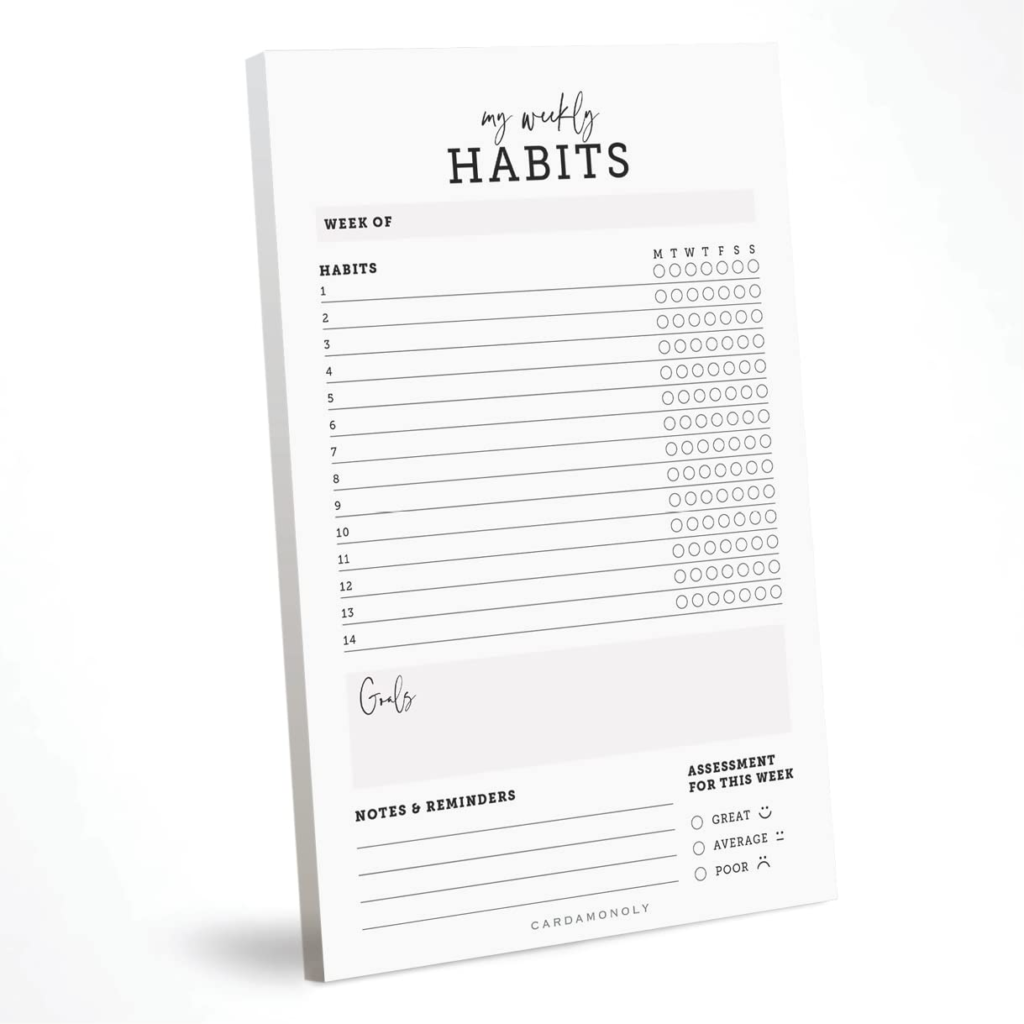
Measuring your actions builds awareness and motivation. You can:
- Use a habit-tracking app
- Keep a paper tracker
- Reward yourself for streaks
📗 Recommended Product:
Habit Tracker Notepad – Great for visual motivation and staying accountable.
6. Set Clear Goals with Deadlines
Vague goals = vague results. Be specific:
- “Read 10 pages a day” instead of “Read more”
- “Workout M/W/F for 30 mins” instead of “Get fit”
Writing your goals down increases follow-through by over 40%.
📘 Read More:
Eat That Frog! by Brian Tracy – Learn how to stop procrastinating and get more done with focused goals.
7. Practice Self-Compassion
Slip-ups will happen. Instead of giving up:
- Reflect on what went wrong
- Adjust your strategy
- Get back on track the next day
💬 Self-discipline isn’t about being perfect—it’s about being persistent.
✅Summary of Actionable Tips
| Strategy | Why It Works |
|---|---|
| Start Small | Builds consistency without overwhelm |
| 5-Minute Rule | Reduces resistance to starting tasks |
| Plan Your Day | Gives structure and reduces decisions |
| Eliminate Temptations | Makes discipline the default option |
| Track Your Habits | Creates accountability and motivation |
| Set Clear Goals | Makes progress measurable |
| Be Kind to Yourself | Keeps you going even after setbacks |
Overcoming Common Obstacles to Self-Discipline
Even with the best intentions, staying consistent can be tough. Life throws distractions, temptations, and setbacks our way. But the good news? Most of these challenges can be managed with awareness and the right strategies.
Let’s look at the most common obstacles to self-discipline—and how to overcome them.
1. Lack of Motivation
The Problem: You feel fired up one day, then can’t bring yourself to act the next.
The Fix:
- Focus on building systems, not relying on motivation
- Use a daily routine to make discipline automatic
- Revisit your “why” regularly—remind yourself of the bigger picture
📘 Recommended Read: Drive by Daniel Pink – Understand the science behind motivation and how to tap into it consistently.
2. Constant Distractions

The Problem: Notifications, noisy environments, or switching between tasks too often.
The Fix:
- Create a distraction-free workspace
- Use time-blocking techniques or the Pomodoro method
- Silence or remove digital distractions during deep work
3. Poor Time Management
The Problem: You run out of time before you get to your most important tasks.
The Fix:
- Plan your day in advance using a simple to-do list
- Tackle your hardest task first (“Eat the frog”)
- Limit time spent on low-priority tasks
📘 Helpful Tool: The Productivity Planner – A simple tool to organize your day around top priorities.

4. Negative Self-Talk
The Problem: Telling yourself, “I always fail,” or “I’m not disciplined enough.”
The Fix:
- Reframe mistakes as learning opportunities
- Use affirmations and mindset journaling
- Celebrate small wins to build confidence
5. All-or-Nothing Thinking
The Problem: Missing one workout or cheat meal makes you feel like giving up entirely.
The Fix:
- Embrace progress over perfection
- View discipline as a long-term practice, not a short-term challenge
- Focus on consistency, not streaks
📘 Recommended Read: The Slight Edge by Jeff Olson – A great book on the power of small, consistent actions.
Quick Recap Table: Problems & Solutions
| Obstacle | Solution |
|---|---|
| Lack of Motivation | Build routines, revisit your “why” |
| Constant Distractions | Remove triggers, use focused time blocks |
| Poor Time Management | Plan ahead, prioritize top tasks |
| Negative Self-Talk | Practice positive affirmations |
| All-or-Nothing Thinking | Aim for progress, not perfection |
The Role of Environment and Support Systems
Your surroundings and the people you engage with play a powerful role in shaping your behavior. When you’re trying to build self-discipline, setting up the right environment and support system can make success much easier—and setbacks far less likely.
1. Design Your Environment for Success

Your physical space should make it easy to do the right thing and hard to slip into bad habits.
Examples:
- Keep healthy snacks visible and junk food out of sight
- Place your workout gear by your bed the night before
- Declutter your desk to reduce distractions
📌 Tip: Use visual cues like sticky notes, alarms, or a whiteboard to stay on track.
2. Surround Yourself with Supportive People
The people around you can either build you up—or drag you down. Studies show that behavior is contagious, so choose your influences wisely.

Action Steps:
- Spend time with goal-oriented, disciplined individuals
- Share your goals with a friend or mentor for accountability
- Avoid toxic or negative influences that encourage shortcuts or laziness
📘 Try This: Create or join a group challenge (e.g., 30-day habit challenge or accountability partner check-ins).
3. Use Digital Tools as Support Systems
Apps and tools can help reinforce habits, monitor progress, and give you structure:
- 📅 Todoist – Great for creating to-do lists and setting reminders
- ⏱ Clockify – Useful for tracking how your time is spent
- 📊 Toggl – A simple time tracker that helps boost productivity
These tools serve as digital accountability partners—keeping your discipline on track even when motivation dips.
✅ Summary
| Element | How It Supports Self-Discipline |
|---|---|
| Organized Environment | Reduces decision fatigue and temptation |
| Supportive Relationships | Builds accountability and encouragement |
| Productivity Tools | Helps monitor and reinforce positive habits |
Self-Discipline in Different Contexts
Self-discipline isn’t one-size-fits-all. It shows up in different ways depending on where and how it’s applied. Understanding how discipline functions across key areas of life can help you develop targeted strategies to improve it.
Let’s explore how self-discipline plays a vital role in various contexts:
1. At Work or in Business

In a professional setting, self-discipline is essential for staying productive and achieving long-term success.
Examples:
- Meeting deadlines without micromanagement
- Prioritizing high-impact tasks over easy distractions
- Maintaining professionalism during high-stress situations
🧠 Pro Tip: Use time-tracking tools like Toggl or Clockify to build structure into your workday.
2. In Education and Learning
Whether you’re a student or lifelong learner, self-discipline helps you retain information and avoid procrastination.
Examples:
- Sticking to a study schedule
- Turning off social media while reading or writing
- Breaking down large projects into manageable tasks
📘 Book Suggestion: Deep Work by Cal Newport – A fantastic guide to mastering focus and minimizing distractions.
3. Health and Fitness
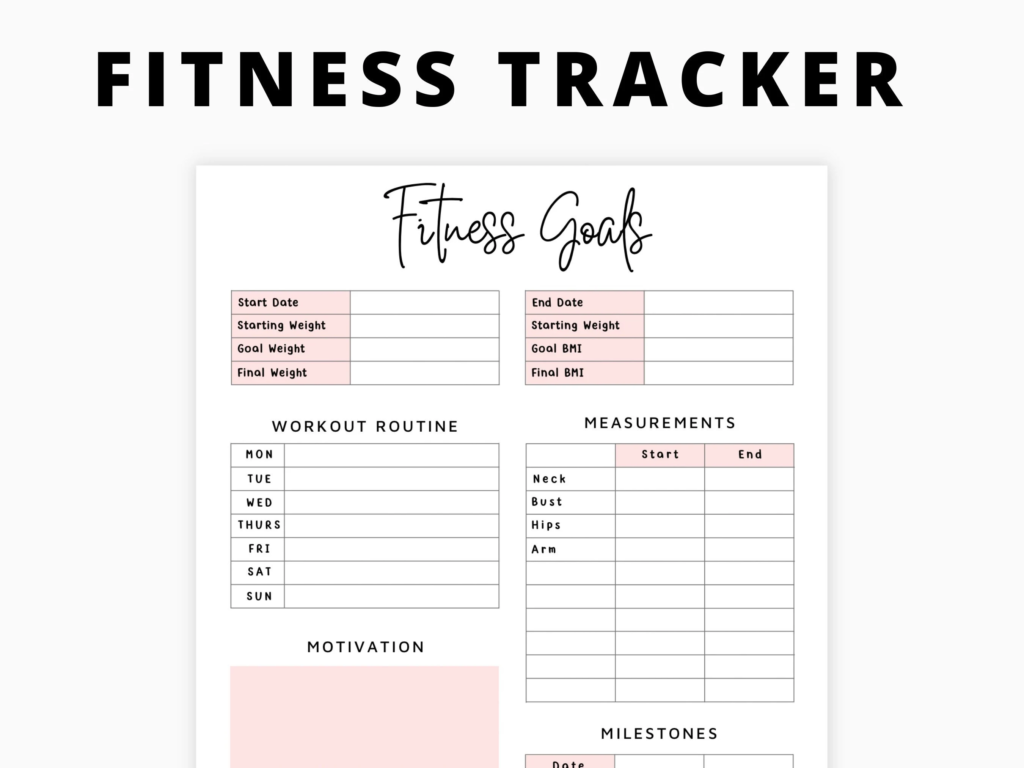
Physical health requires mental discipline. Whether you’re building a workout routine or eating better, consistency is key.
Examples:
- Waking up early to exercise even when you don’t feel like it
- Saying no to junk food when your goals matter more
- Tracking meals or workouts to stay accountable
🧠 Tip: Set specific, realistic health goals and track them using habit apps or journals.
4. Financial Management
Discipline is just as important with your wallet as it is with your willpower.
Examples:
- Saving before spending
- Avoiding impulse purchases
- Following a monthly budget
📘 Tool Suggestion: Try using a budget planner like the Clever Fox Budget Book to stay on track.
5. Emotional and Mental Resilience
Self-discipline also shows up internally—managing your emotions and reactions.
Examples:
- Taking a breath before responding in anger
- Staying committed to personal growth practices (like journaling or meditation)
- Controlling urges that lead to regretful behavior
📘 Suggested Read: Atomic Habits by James Clear – Learn how small, mindful decisions build lasting discipline.
Summary Table: Self-Discipline by Life Area
| Context | Key Traits of Self-Discipline |
|---|---|
| Work/Business | Time management, focus, task completion |
| Education | Study habits, consistency, avoiding procrastination |
| Health & Fitness | Routine building, resisting temptation |
| Finances | Budgeting, delayed gratification, saving habits |
| Emotional/Mental Life | Emotional control, mindfulness, personal growth |
Maintaining Long-Term Self-Discipline and Avoiding Burnout
Building self-discipline is one thing—maintaining it over time is a whole different challenge. Many people start strong, only to burn out or lose momentum weeks later. The secret? Balance consistency with recovery.
Let’s break down how to stay disciplined in the long run—without exhausting yourself.
1. Embrace the Power of Consistency, Not Intensity

Self-discipline isn’t about pushing yourself to the edge every day. It’s about showing up consistently—even if your effort is small.
✅ Try this:
- Do 20 minutes of focused work daily instead of a 3-hour sprint once a week
- Go for short daily walks instead of extreme weekly workouts
- Write 1 paragraph a day instead of waiting for hours of inspiration
🧠 Quote to Remember:
“Small daily improvements are the key to staggering long-term results.” — Robin Sharma
2. Schedule Time for Rest and Recovery
Burnout often disguises itself as a loss of motivation or discipline—but it’s really a lack of rest.
💡 Build recovery into your routine:
- Take regular breaks using the Pomodoro technique
- Schedule time for hobbies, nature, or screen-free relaxation
- Get 7–8 hours of quality sleep each night
📘 Helpful Tool: Calm App – Great for guided meditation, sleep support, and mental resets.
3. Review and Adjust Your Goals

Your goals should evolve as you do. Regular check-ins help keep your motivation aligned and your actions meaningful.
🔄 How to do it:
- Every 2–4 weeks, ask yourself: “Is this goal still important?”
- Adjust timelines if you’re feeling overwhelmed
- Celebrate progress—even if it’s not perfect
📘 Try This: Use a simple journal or habit tracker to reflect weekly.
4. Use Sustainable Motivation
Short bursts of motivation can help you start—but purpose is what keeps you going. Long-term self-discipline is fueled by values and deeper reasons.
💬 Ask yourself:
- Why do I want this?
- Who else benefits from my discipline?
- What would it feel like to follow through?
📘 Recommended Read: Grit by Angela Duckworth – Learn how passion and perseverance drive success over time.
🧩 Summary: Sustainable Self-Discipline Framework
| Practice | How It Helps Long-Term Discipline |
|---|---|
| Consistent small efforts | Builds momentum and avoids burnout |
| Rest and recovery | Prevents mental and physical exhaustion |
| Regular goal check-ins | Keeps motivation fresh and aligned |
| Deeper motivation/purpose | Provides lasting drive beyond short-term hype |
✅Conclusion: The Journey of Self-Discipline
Mastering self-discipline isn’t about perfection—it’s about progress. Whether you’re trying to improve your health, grow your career, or simply become more consistent in your daily habits, self-discipline is the foundation that makes lasting success possible.
From understanding the psychology behind it to applying strategies in real life, your ability to stay focused, manage distractions, and stay committed will determine how far you go.
Remember:
- Start small
- Stay consistent
- Adjust as you grow
- And don’t forget to rest along the way
Surround yourself with the right environment, use helpful tools, and lean on support systems when needed. With patience and practice, self-discipline will go from a challenge to a way of life.

